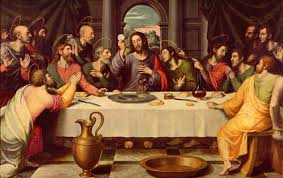The Eucharist
 Catholics believe, as Christ taught, that the Eucharist is his “literal” body and blood.
Catholics believe, as Christ taught, that the Eucharist is his “literal” body and blood.
Is Christ only present “symbolically” in the Eucharist?
Christ instituted the Holy Eucharist on the night before He died, i.e., on the first Holy Thursday, when He changed bread and wine into His Body and Blood; and then commanded His Apostles to do what He had done in commemoration of Him.
“And while they were at supper, Jesus took bread, and blessed and broke, and gave it to His disciples, and said, ‘Take and eat; this is my body.’ . . . And taking a cup, He gave thanks and gave it to them, saying, ‘All of you drink of this; for this is my blood of the new covenant.” St. Matt. 26:26, 28
Our Lord meant literally to change the bread and wine into His body and blood instead of leaving us a mere symbol or memorial of His passion. We know this from the words of His promise to do this in St. John’s gospel, Chapter 6. The important words of this chapter are: John 6:52, “The bread that I will give is my flesh for the life of the world.”
John 6:54, “. . . unless you eat of the flesh of the Son of man, ye shall not have life in you.” John 6:56, “For my flesh is food indeed and my blood is drink indeed.”
These, and other texts must be taken literally because the entire context demands it; and because any other interpretation would involve us in absurd consequences. The words’ “Eat my flesh and drink my blood” in a figurative interpretation would mean to “persecute or hate bitterly.” In this sense, it would mean that our Lord would promise those who hate Him, eternal life and glorious resurrection.
The grammatical construction of the phrases, “This is My Body,” and “This is My Blood,” does not admit of a figurative or symbolic meaning. When the verb “to be” is used, the antecedent must always be identical with the consequent, i.e., “This” must be identical with “My Body.” Therefore, there must have been a change of substance.
The Apostles understood Christ to speak literally.
“The cup of benediction which we bless, is it not the sharing of the blood of Christ, And the bread that we break, is it not the partaking of the body of the Lord?” 1 Cor. 10:16
“Therefore, whoever eats this bread or drinks the cup of blessing which we bless, unworthily, will be guilty of the body and the blood of the Lord.” I Cor. 10:27
This has been the continuous belief of Christianity until the time of the Reformation. What did the early Church Fathers think about the Eucharist ? St. Irenaeus, bishop of Lyons and a pupil of St Polycarp had been taught by St. John the Apostle. His comment, (around 195 A.D.): “He (Jesus) has declared the cup, a part of creation, to be His own blood, from which He causes our blood to flow; and the bread, a part of creation, He has established as His own Body, from which He gives increase to our bodies.”
St. Ignatius of Antioch, a disciple and contemporary of the Apostle John. His comment, (around 110 A.D.) concerning certain heretics: “They abstain from the Eucharist and from prayer, because they do not confess that the Eucharist is the Flesh of our Savior Jesus Christ, Flesh which suffered for our sins and which the Father, in His goodness, raised up again.”
St. Cyril of Jerusalem, in the middle of the fourth century, (350 A.D.) at a catechetical lecture commented: “Do not, therefore, regard the bread and wine as simply that; for they are, according to the Master’s declaration, the Body and Blood of Christ. Even though the senses suggest to you the other, let faithmake you firm. Do not judge in this matter by taste, but be fully assured by the faith, not doubting that you have been deemed worthy of the Body and Blood of Christ.
St. Justin Martyr wrote in his apology to the emperor at Rome (around 150 A.D.): “We call this food Eucharist; and no one else is permitted to partake of it, except one who believes our teaching to be true…. For not as common bread nor common drink do we receive these; but since Jesus Christ our Savior was made incarnate by the word of God and had both flesh and blood for our salvation, so too, as we have been taught, the food which has been made into the Eucharist by the Eucharistic prayer set down by Him, and by the change of which our blodd and flesh is nourished, is both the Flesh and the Blood of that incarnated Jesus.”

You must be logged in to post a comment.